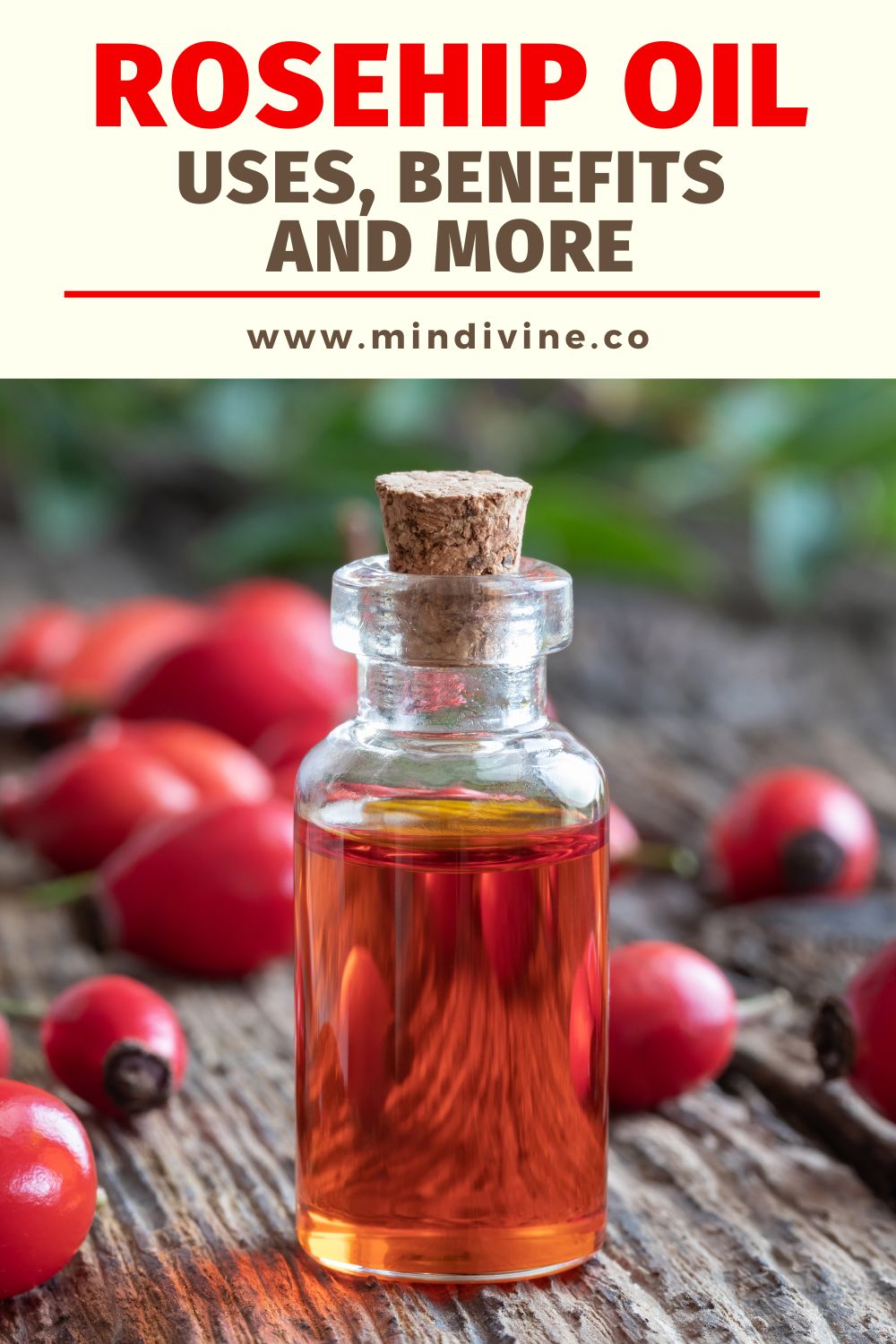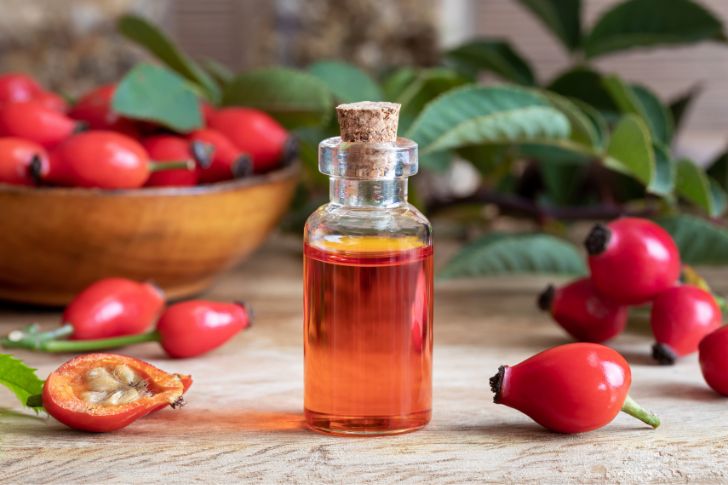Rosehip oil is one of those “gifts of nature” that you can not fail to take advantage of by incorporating into your beauty and health care routines. Indeed, if you are here, it is because you have already heard about this amazing natural oil.
In this post, I will tell you everything you need to know to get the most out of pure rosehip oil: what it is, its properties and benefits, how to use it, and the precautions you should take. Read on and find out everything!
What is Rosehip Oil?
The rose hip is a wild shrub of the Rosaceae family and its scientific name is Rosa rubiginosa L. or Rosa eglanteria L.
The origin of this shrub is believed to be European, as it is very common in the United Kingdom for the beauty of its flowers. However, it also grows wild in South America, mainly in the Andes Mountains of Chile and Argentina.
In the last few years, thanks to its excellent properties, the cultivation of the Rosa rubiginosa L. plant has spread to almost every corner of the world, and its oil is one of the most used oils worldwide, primarily for skin care. This is the reason why it is present in a large number of cosmetic products.
Rosehip oil is obtained from the cold pressing of the seeds of the fruits of this plant, thus preserving all its magnificent qualities. Currently, the largest producer of this oil is Chile.
Pure Rose Hip Oil Composition
The main properties and benefits of this oil come from the nutrients it contains, essentially 80% of fatty acids such as linoleic (46%), linolenic (34%), and oleic (16%).
These essential fatty acids, which cannot be synthesized by the body, are necessary to generate and form the phospholipids of epithelial cell membranes. This is why it is so beneficial for health and skin care.
In addition, fatty acids such as omega-3 and omega-6 are essential for several basic functions of the body, such as cell and tissue regeneration and renewal.
This oil has high percentages of vitamins A, C, and E which give it excellent antioxidant properties, as well as vitamins B1, B2, B3, and K which give it its incredible regenerative and healing qualities.
The comedogenic index of rosehip oil is 1, so it can be used normally on all skin types but is especially ideal for oily skin.

What is Rose Hip Oil Used for?
Although pure rosehip oil is typically recommended in cases of excessively dry skin, as it helps to regenerate and moisturize it deeply, it is also used to:
- Heal skin ulcerations.
- Heal sutures.
- Improve the appearance of scars, burns, and wounds.
- Prevent and attenuate stretch marks.
- Relieve irritation and repair damaged skin.
- Stimulate and improve blood circulation.
Properties of Rose Hip Oil
Pure rosehip has many useful properties. Among these are that it improves immunity, as well as having an antiplatelet and vasodilator action, and improves the permeability of the epidermal barrier.
It is an oil with excellent firming, moisturizing, and regenerating properties, as well as anti-inflammatory, anti-aging, and antioxidant.
Many studies confirm these properties. In fact, a study conducted by the Cleveland Clinic in the United States indicated that the large amount of vitamin C contained in rose hip oil stimulates the generation of collagen, helping to reduce expression lines and wrinkles.
Benefits of Rosehip Oil for the Face and Skin
The composition and properties I just mentioned make rose hip oil has direct benefits for the health and appearance of the skin in general, mainly on the face, such as:
- Prevents and delays premature aging of the skin and the appearance of wrinkles: thanks to the large number of antioxidants and vitamins it contains, it is able to penetrate into the deep layers of the skin and stimulate collagen production.
- Reduces and improves the appearance of stretch marks: its high percentage of antioxidants and vitamins A and C help reduce stretch marks.
- It helps fight photoaging caused by UV rays: its content of essential fatty acids and antioxidants improves pigmentation. And vitamin C counteracts collagen depletion caused by sun exposure.
- Deeply moisturizes the skin and protects it from external aggressions: preventing skin dehydration, keeping it soft and elastic for longer, and making it less vulnerable to external aggressions.
- Reduces inflammation: the polyphenols and vitamin E it contains help reduce skin inflammation and soothe irritation caused by dermatitis, psoriasis, and eczema.
- Eliminates pigmented skin blemishes: it has high anti-stain power, as it is highly rehydrating and antioxidant.
- Helps prevent and eliminate acne: because it contains linoleic acid, it helps to reduce inflammation, cure and prevent acne, as well as rosacea.
- Reduces scars caused by wounds or surgery: the fatty acids it contains help to soften scars and regenerate the skin.
- Helps regenerate skin damaged by burns: it increases skin elasticity and improves its healing capacity, recovering both the color and texture of burned skin.
- Nourishes cuticles and strengthens nails: its essential fatty acids nourish and moisturize the cuticles, prevent nails from breaking, prevent ridges from appearing on the nail surface, and promote nail growth.
Benefits of Rosehip Oil for the Hair
Regarding the benefits of pure rosehip oil for hair, the following can be mentioned:
- Moisturizes and strengthens dry, frizzy, and damaged hair, improving its appearance.
- Prevents and solves dandruff problems.
- Prevents frizz.
- Prevents gray hair.
- Gives volume and silkiness to the hair.
Health Benefits of Pure Rose Hip Oil
In addition to the benefits mentioned above for skin and hair, there are numerous studies that confirm that rosehip oil is also very good for treating and relieving some ailments and diseases, including:
- Prevent cardiovascular ailments (especially in obese people).
- Reduce bad cholesterol.
- Prevent the development of diabetes (by regulating blood sugar levels).
- Help prevent respiratory problems, such as asthma.
- Prevent the development of varicose veins.
- Decrease pain caused by osteoarthritis and arthritis.
- Help prevent the onset of cancer (thanks to containing carotenoids, polyphenols, and flavonoids).

Use of Rose Hip Oil in Pregnancy
Rosehip oil can especially help during pregnancy, as I said before, to prevent all types of stretch marks.
It can even be applied to the vaginal area for perineal massage, which will give more elasticity to this area of the body, facilitating dilation during labor.
After delivery, it can be used on the stitches to aid healing.
Can it be used during lactation?
Although no counterproductive effects have been found in its use during breastfeeding, it is recommended not to apply it on the nipple to prevent the baby from ingesting it.
However, it is always advisable to consult your doctor before use if you are pregnant or breastfeeding.
How to Use Rose Hip Oil
This wonderful oil is easily absorbed into the skin and hair so that you can use it anywhere on the body. You have several ways to use it:
- Pure, directly applied.
- In your beauty recipes and home remedies.
- It is an excellent massage oil.
- Add it to your favorite cosmetic products, whether for the face, body, or hair.
- As a carrier oil for your essential oils.
Let’s see how you can use this oil in its pure form, which, by the way, is my preferred approach:
In Your Daily Skin Care Routine
Apply after cleansing, toning, and, if necessary, exfoliating. Wait a few minutes for it to absorb, and then continue with your usual moisturizing treatment.
Rose Hip Oil for the Face
Just 2 to 3 drops warmed between the fingertips and massaged on the face, neck, and décolleté after cleansing twice a day are enough. This will keep your facial skin glowing, protected, nourished, and rejuvenated.
Treating Scars and Skin Lesions
For scars, erosions, skin ulcers, or burns, gently massage a few drops on the affected area in the morning and evening, either alone or combined with other vegetable oils, such as coconut oil, extra virgin olive oil, or sweet almond oil.
Never use on open wounds.
On the Body
Gently massage a few drops into the areas you notice dryness or stretch marks. It is also ideal for use as a body oil.
For Hair Care
To make a hair mask, massage all over the hair and leave it on for 30 minutes, covering it with a shower cap. Then rinse well and wash as usual.
Scalp Treatment
For dandruff or dryness, massage the pure oil into the affected areas of the scalp. After 20 – 30 minutes, rinse thoroughly and apply your shampoo.
Precautions and Contraindications of Rose Hip Oil
The side effects of pure rosehip oil are very rare, especially when applied to the skin.
As always, I recommend performing a patch test with a small amount of oil to confirm that no adverse reactions, such as irritation or inflammation, occur. If, after 24 hours, you do not show any signs, it should be safe to use.
If you are pregnant or breastfeeding, have kidney stones, iron-related disorders such as anemia, or are undergoing surgery, consult your physician before use.
In case you use this oil to treat a skin or scalp condition, use it with care and consult a dermatologist if you do not notice any improvement after a few weeks.
Rosehip oil can go rancid quickly, so you should store it in a cool, dark place to extend its shelf life. You can also store it in the refrigerator.
Where to Buy Rosehip Oil and Which One to Choose
You can get this oil in pharmacies and online stores, in large supermarkets, as well as in herbalist and health food stores.
My recommendation is to buy it online, on Amazon, because you can do it from the comfort of your home, and you will be able to see the opinions of other buyers. In addition, you will have it at your doorstep in just a few days. They also usually have the best prices and a wide variety of brands.
Which Rose Hip Oil is the Best?
In order for you to recognize a pure and quality rosehip oil, please consider the following:
- Container: it should be made of glass, blue or brown in color, as this prevents it from coming into contact with light and preserves its properties better.
- Label: must indicate 100% pure and organic or bio with the seals that certify it, obtained by cold pressing, and without chemical additives.
- Scent: it is very subtle and can be slightly woody, unrefined oil that dissipates quickly on the skin. It does not have to smell like roses, as it does not come from the flower.
- Color: it ranges from an intense golden to a reddish-orange. If it has a transparent color or any other color, it is refined oil.
My favorite and the one I use is organic rose hip oil, which you can buy here.
Final Words
Rosehip oil is an incredibly versatile vegetable oil and can be used in a variety of ways on the face, body, and hair.
Now that you know the great benefits of pure rosehip oil, what are you waiting for to start using it?
As you can see, this oil will help you fight premature aging and keep your skin more beautiful than ever. It provides brightness and uniformity to the skin, regenerates and heals it, in addition to promoting its elasticity and collagen production.
On the hair and scalp, rosehip oil is a natural treatment that can promote healthier hair.
Therefore, if you want your skin and hair to look soft and perfect, start using it as soon as possible, and you will see excellent results in a short time.
If you liked this post, please share it. Save THIS PIN below to your Natural Oils board on Pinterest and check it later! 🙂


